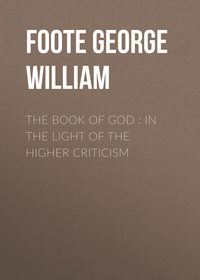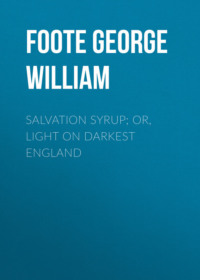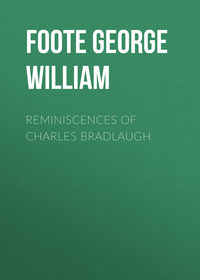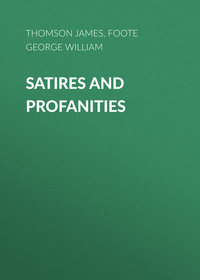 полная версия
полная версияFlowers of Freethought (Second Series)
Dr. Hitchens preached from the text, "The earth shall be full of the knowledge of the Lord" – a statement which, after the lapse of so many centuries, has still to be couched in the future tense. The delay has been excessive, but Dr. Hitchens is hopeful. He believes in the ultimate and speedy fulfilment of the prophecy. One of his grounds for so believing is this (we quote from the Christian Commonwealth), that "Out of 20 leading lecturers, authors, editors, and debaters on the side of Infidelity 17 have been brought to Christ within the last 30 years, have left their infidel associations, openly professed the religion of Jesus, and engaged in Christian work." The last he named, we are told, was "the case of a National Secular lecturer, of whom the sceptics were greatly proud, who has recently been received by, and now lectures for, the Christian Evidence Society."
We leave the consideration of these "facts" for a moment, and deal in the first place with Dr. Hitchens's peculiar logic. It is truly Christian. The species is unmistakable. Seventeen Freethinkers have been converted to Christianity! Wonderful! But how many Christians have been converted to Freethought? Ay, there's the rub. For every specimen Dr. Hitchens produces we will produce a thousand. Not only were the rank and file of the Freethought party very largely brought up as Christians, but its leaders are of the same category. Charles Bradlaugh was brought up as a Christian, so was Colonel Ingersoll. Can Dr. Hitchens produce two names among his "converts" of the same weight, or a half, a quarter, or a tithe of it? Every leader of Freethought in England, we believe, is a convert from Christianity. As to the "leading" men Dr. Hitchens refers to, we presume they are the persons initialed in the late Mr. Whitmore's tract, and those among them who were leaders were not converted, and those who were converted were not leaders. The real leaders of the Freethought party, those who were long in its service, and were entrusted with power and responsibility, were never converted. And the cases on Mr. Whitmore's list are old. They have an ancient and fish-like smell. Dr. Hitchens will perhaps be good enough to tell us the name of any man of real distinction in the Freethought party who has been "converted" during the last twenty years. We defy him to do so. If he goes back far enough he will find a few men who were not trusted in our party, and a few weaklings who could not fight an uphill battle, who went over to the enemy. Real leaders of our party fought, suffered, and starved, but they never deserted the flag. Christianity could not convert a Bradlaugh or a Holyoake; it could only bribe or allure a Sexton or a Gordon, or others of the "illustrious obscure" in Mr. Whitmore's fraudulent catalogue. In short, the "conversions" to Christianity so trumpeted are mostly dubious, generally insignificant, and all ancient. If the prophecy which Dr. Hitchens preached from is to be accomplished, it will have to quicken its rate of fulfilment during the past twenty years. We convert tremendously more Christians than you do Freethinkers; the balance is terribly to your disadvantage; you can only make out a promising account by setting down your infinitesimal gains and making no entry of your tremendous losses.
The only recent case that Dr. Hitchens refers to is that of "a National Secular lecturer, of whom the sceptics were greatly proud." Dr. Hitchens evidently takes this gentleman at his own estimate. That he thinks the sceptics were greatly proud of him is intelligible; it is quite in keeping with his shallow, vulgar, And egotistical nature. But the truth is "the sceptics," in any general sense, were not proud of him. He was a very young man, with a great deal to learn, who had a very brief career as a Secularist in East London. In a thoughtless moment a local Secular Society gave him office, and that fact is his entire stock-in-trade as a "converted Freethinker." He was never one of the National Secular Society's appointed lecturers; he was neither "author, editor, or debater"; and he was utterly unknown to the party in general. Dr. Hitchens has, in fact, discovered a mare's nest. We are in a position to speak with some authority, and we defy him to name any Freethinker "of whom the sceptics were greatly proud" who has of late years been converted to Christianity. It is easy enough to impose on an ignorant congregation, and Dr. Hitchens is probably aware of the lengths to which a reckless pulpiteer may carry his mendacity. But candid investigators will conclude that "converted infidels" cannot be very plentiful, when the majority of them are so ancient; nor very important, when an obscure youth has to be advertised as "a leader" of whom the sceptics (nine out of ten of them never having heard of him) were "greatly proud."
We should imagine that Dr. Hitchens is rather new to this line of advocacy. In the course of time he will learn – if indeed he has not already learnt, and is concealing the fact – that the "converted infidels" will not stand a minute's scrutiny. The only safe method is to drop questionable cases and resort to sheer invention. Even that method, however, is not devoid of peril, as one of its practitioners has recently discovered. The Rev. Hugh Price Hughes must by this time be extremely sorry he circulated that false and foolish story of the converted Atheist shoemaker. The exposure of it follows him wherever he goes, and illustrates the truth of at least one Bible text – "Be sure your sin will find you out."
MRS. BOOTH'S GHOST
The Booth family have all keen eyes for business. If they shut their eyes you can see it by their noses. It is not surprising, therefore, to find Mrs. Booth-Tucker capping Mr. Stead's ghost stories with a fine romance about her dead mother. While the "Mother of the Salvation Army" was dying, the Booth family made all the capital they could out of her sufferings; and when she expired, her corpse was shunted about in the financial interest of their show. Perhaps they would be exhibiting her still if there were no law as to the disposition of corpses. But as that avenue to profit is closed, the only alternative is to make use of Mrs. Booth's ghost, and this has just been done by one of her daughters.
Mrs. Booth-Tucker contributes her ghost story to the Easter number of All the World. No doubt Easter was thought a seasonable time for its publication. Christians are just then dreaming about the great Jerusalem ghost, and another "creeper" comes in appropriately.
Mr. Stead catches up Mrs. Booth-Tucker's ghost story and prints it in the Review of Reviews. He admits the want of evidence "as to its objectivity," which is a euphemism for "no evidence at all," and then observes most sapiently that if it was only a dream, "the coincidence of its occurrence at the crisis in her illness is remarkable" – which is precisely what it is not.
Mrs. Booth-Tucker was very ill on board a steamer when she saw her mother, fresh from "the beautiful land above." "Those with me," she says, "thought I was dying, and I thought so too." When a person is in that state, after a wasting illness, the brain is necessarily weak. But this was not all. "I had not slept," the lady says, "for some days, at any rate not for many minutes together." Her brain, therefore, was not only weak, but overwrought; and in ingenuously stating this at the outset the lady gives herself away. Given a wasted body, weakness "unto death," a brain ill supplied with blood and ravaged with sleeplessness; does it, we ask, require a "rank materialist" to explain the presence of "visions" without the aid of supernaturalism?
"Suddenly," Mrs. Booth-Tucker says, "I saw her coming to me." But how "coming"? The lady tells us she was lying in "a small sea cabin." This does not leave much room for the "coming" of the ghost. We should also like to know why a lady thought to be dying was left alone. It is certainly a very unusual circumstance.
Mrs. Booth's ghost, after as much "coming" as could be accomplished in "a small cabin," at last "sat beside" her sick daughter "on the narrow bunk." No doubt the seat was rather incommodious, but why should a ghost sit at all? It really seems to have been a mixed sort of ghost. Apparently it came through the ship's side, or the deck, or the cabin-door, or the key-hole; yet it was solid enough to touch Mrs. Booth-Tucker's hand and kiss her? Nay, it was solid enough to carry on a long conversation, which does not seem possible without lungs and larynx.
Mrs. Booth's ghost said a great deal. "Wonderful words they were," says Mrs. Booth-Tucker. This whets our curiosity. We are always listening for "wonderful words." But, alas, we are doomed to disappointment. The lady knows her mother's words were "wonderful," but she cannot reproduce them. Here memory is defective. "I can remember so few of the actual words," she says. Nevertheless, she gives us a few samples, and they do not seem very "wonderful." Here are two of the said samples: "Live, live, live, remembering that night comes always quickly, and all is nothingness that dies with death!" "Fight the fight, darling; the sympathy of Christ is always with you, and every effort you make is heaping up treasure for you in Heaven."
We fancy we have heard those "wonderful words" before. For all their wonderfulness, ghosts are seldom original. Mrs. Booth-Tucker reminds us of the gushing lady novelist, who describes her hero as divinely handsome and miraculously clever, but when she opens his mouth, makes him talk like a jackass.
"General" Booth's daughter does not see that she found words for her mother's ghost. She is not so sharp as Dr. Johnson, who carried on a discussion with an adversary in a dream, and got the worst of it. For a time he felt humiliated, but he recovered his pride on reflecting that he had provided the other fellow with arguments.
When Mrs. Booth-Tucker tells that "the radiance of her face spoke to me," we can easily understand the subjective nature of her "vision," and as readily dispense with a budget of those "wonderful words."
Nor are we singular in incredulity. Mr. Stead cannot put his tongue in his cheek at a member of the Booth family, but the Christian Commonwealth says "the story is both improbable and absurd," and adds, "it is just such fanaticism as this that brings religion into contempt with many educated people." Our pious contemporary, like any wretched materialist, declares that many persons have seen ghosts "when under the influence of fever or in a low state of health."
All this is sensible enough, and in a Christian journal very edifying. But if our pious contemporary only applied this criticism backwards, what havoc it would make with the records of early Christianity! Mrs. Booth-Tucker is not in all points like Mary Magdalene, but she resembles her in fervor of disposition. Out of Mary Magdalene we are told that Jesus cast "seven devils," which implies, rationalistically, that she was strongly hysterical. She was more likely to be a victim of "fanaticism" than Mrs. Booth-Tucker. Yet the ghost story of Mrs. Booth's daughter is discredited, and even stigmatised as discreditable, while the brain-sick fancies of Mary Magdalene are treated as accurate history. She was at the bottom of the Jerusalem ghost story, and her evidence is regarded as unimpeachable. So much do circumstances alter cases!
Our pious contemporary regards all modern ghosts as "fever dreams." So do we, and we regard all ancient ghosts in the same light The difference between ancient and modern superstition is only a question of environment. Superstition itself is always the same; it no more changes than the leopard's spots or the Ethiopian's skin. But the environment changes. From the days when there was no scientific knowledge or rigorous criticism we have advanced to an age when the electric search-light of science sweeps every corner and criticism is remorseless. Hence the modern ghosts are served up in Christmas "shockers," while the ancient ghosts are worshipped as gods. But this will not last for ever. The rule of "what is, has been," will eventually be applied to the whole of human history, and the greatest ghost of the creeds will "melt into the infinite azure of the past."
TALMAGE ON THE BIBLE
Talmage is the Spurgeon of America. He has all the English preacher's vogue as well as his orthodoxy. But he resembles Spurgeon with a difference. He is distinctly American. No one equals the Yankee at "tall talk," and what Yankee equals Talmage in this species of composition? The oracle of the Brooklyn Tabernacle licks creation in that line. Here is a specimen of his spread-eagle eloquence, taken from the sermon we are about to criticise: – "The black and deep-toned bell of doom hangs over their heads, and I take the hammer of that bell, and I strike it three times with all my might, and it sounds Woe! Woe! Woe!" Perhaps it does, but Talmage is wrong in his spelling. What the bell of doom, so impudently struck by this mannikin, really sounds is doubtless "Woh! Woh! Woh!" It wants the presumptuous spouter to leave off playing the part of God Almighty.
Over in America, as well as here in England, the Bible is meeting with misfortune. Christian ministers are showing up its blunders and inconsistencies. Its foes are now of its own household. Talmage is not frightened, however; he keeps a stiff upper-lip; and it must be admitted, he has a good deal of upper-lip to keep stiff. Since he visited the Holy Land his faith is strong enough to swallow whales. Now he knows that what the Bible says is true.. He has seen the place where it happened.
But faith is a tender plant. Talmage says it is easily destroyed. "I can give you a recipe for its obliteration," he cries; and it is this – "Read infidel books; have long and frequent conversations with sceptics; attend the lectures of those antagonistic to religion." Yes, faith is a tender plant. The believer is a hot-house production. He dies in the open-air. The Bible can be read by Freethinkers, and it confirms them in their scepticism; but if a Christian reads infidel books he is lost. Hearing the other side is fatal to his faith. It is Talmage who states so, and, as old Omar Khayyam says, he knows, he knows.
Somewhat paradoxically – but who expects logic from the pulpit? – the great Talmage declares, "I do not believe there is an infidel now alive who has read the Bible through." He offers a hundred dollars reward to any infidel "who has read the Bible through twice" – which discounts his certainty that no infidel had read it through once. A good many infidels might apply for that hundred dollars, but Talmage will never hand it over. An infidel's word is not good enough – not for Talmage. "I must have the testimony," he exclaims, "of someone who has seen him read it all through twice." A very safe condition! for who has ever seen any man read the Bible through? And if the witness happened to be an infidel – as is likely – Talmage would want the testimony of someone else who had seen him see the other man reading it; Talmage is not very wise, but he is not exactly a fool, and he and his money are not soon parted.
There is an "infidel" in America who has read the Bible through. His name is Robert G. Ingersoll. Talmage should discuss the Bible with him. But he won't. He knows what his fate would be in such an encounter. "And they gathered up of the fragments that remained twelve baskets full."
There is also an "infidel" in England who has read the Bible through. More than one, of course, but we know this one so intimately. He was shut up in Holloway Gaol for knowing too much about the Bible. During the first eight weeks of his sojourn there the "blessed book" was his only companion. It was the Bible, the whole Bible, and nothing but the Bible. That prisoner read it through from the first mistake in Genesis to the last curse in Revelation; read it through as Talmage never did, for there were no distractions, no letters to answer, no morning and evening newspapers, no visitors dropping in. It was a continuous, undisturbed reading, and the man who did it would be happy to let the public decide whether he does not know the Bible as well as Talmage.
Talmage has a very poor opinion of infidels. He thinks that "bad habits" have much to do with scepticism. His narrow little mind cannot understand how anyone can differ from him without being wicked. Still, for decency sake, he makes exceptions. "Mind you," he cries, "I do not say that all infidels are immoral." How kind! How generous! No doubt the infidels will shed tears of gratitude. They are not all immoral. Some of them may be nearly as good as Talmage. Certainly some of them are not so avaricious. Infidels speakers don't insist on having fifty pounds paid in the ante-room before they mount the platform to deliver a lecture.
It appears that Talmage once knew a "pronounced infidel." He was the father of one of the Presidents of the United States. Talmage accepted an invitation to spend a night in his house. "Just before retiring at night, he said, in a jocose way: 'I suppose you are accustomed to read the Bible before going to bed, and here is my Bible from which to read. He then told me what portions he would like to have me read, and he only asked for those portions on which he could easily be facetious."
Talmage gives himself away in this observation. He contends that God wrote the Bible. Why, then, did God write it so that you could easily be facetious about it? It is not so easy to be facetious about Homer, or Plato, or Aristotle, or Dante, or Spinoza, or Shakespeare, or Bacon. There is no humor in the Bible, no wit, and only a little sarcasm. We do not laugh with it, but at it, which is the most fatal form of laughter. It is awfully solemn, but dreadfully absurd. There are things in it to tickle an elephant. Surely it is strange that God should write a book that lends itself so easily to ridicule.
The Spurgeon of Yankeeland goes on to speak about the "internal evidence" of the Bible. This he says is "paramount," though he takes care to skip off as quickly as possible to outside testimony. He cites a number of persons trained up as Christians in favor of the "supernatural" character of the Bible. The first is Chief Justice Chase, of the Supreme Court of the United States – against whom we put a great jurisprudist like Bentham, and a great judge like Sir James Stephen. The second is President Adams – against whom we put President Lincoln. The third is Sir Isaac Newton – against whom we put Charles Darwin. The fourth is Sir Walter Scott – against whom we put Byron and Shelley. The fifth is Hugh Miller – against whom we put Sir Charles Lyell. The sixth is Edmund Burke – against whom we put Thomas Paine, or, if that will not do, Lord Bolingbroke. The seventh is Mr. Gladstone – against whom we put John Morley. "Enough! Enough!" says Talmage. We say so too. Our names quite balance his names collectively. The game of "authorities" can be played on both sides. But is it worth playing at all? Is a great name a substitute for argument? Is authority as good as evidence? Should the jury decide according to the eminence of the pleader's friends, or according to his facts and the force of his reasoning?
Taking advantage of his congregation's ignorance, or exposing his own, Talmage declares that "The discovered monuments of Egypt have chiselled on them the story of the sufferings of the Israelites in Egyptian bondage, as we find it in the Bible." Now, to put it mildly, this is not true. We are also told that "the sulphurous graves of Sodom and Gomorrah have been identified." To put it mildly again, this is not true. We are told next that "the remains of the Tower of Babel have been found." This is not true. Assyrian documents are also said to "echo and re-echo the truth of Bible history," This is not true, according to Professor Sayce, who knows more about Assyrian history than Talmage knows about all things whatsoever. The witness of Assyria repeatedly contradicts the Bible story, not merely in small matters, but in important features. The fact is, Talmage does not know what he is talking about; or, he does know what he is talking about, in which case he is playing a very dirty trick on his hearers' credulity.
With respect to the Pentateuch, it does not trouble Talmage whether it was written by "Moses or Hilkiah or Ezra or Samuel or Jeremiah, or another group of ancients." He declares that "none of them wrote it," for "God wrote the Pentateuch" – that is to say, they "put down only what God dictated; he signed it afterward." But where is the signature? And what a paltry way is this of evading the question at issue! It is all very well to say that the writers of the Pentateuch were "Jehovah's stenographers or typewriters." What we want to know first of all is, who they were, and when they lived.
It is useless to follow Talmage any farther. Suffice it to say that he winds up by warning young Christians against a "Voltaire cyclone" on the one side, and a "Tom Paine cyclone" on the other side. There is something worse than either – a Talmage puddle. The young man who sports in that is only fit for – well, Exeter Hall, or Colney Hatch.
MRS. BESANT ON DEATH AND AFTER
When we first criticised Mrs. Besant's newly-found Theosophy, and thereby incurred her severe displeasure, we predicted that her enthusiastic nature would carry her far on the road, which she thought of true philosophy, but which we thought of gross superstition. Our prediction has been realised; and, unless for some accident, or some sudden turn in Mrs. Besant's mind or life, it will be realised still further. In this, as in other matters (as the French say) it is the first step which costs, because it involves all the following steps. Mrs. Besant placed her feet upon the high road of credulity when she succumbed to the Theosophical high priestess, whose life is a highly interesting and instructive chapter in the history of imposture. Madame Blavatsky had seen much of the world, and was up to most things. She had a surprising power of bamboozling people of some intelligence and culture. The broad-set eyes, and the great tiger-bar between and over them, indicated the species to which she belonged. Mrs. Besant, with her innocences and enthusiasms, was a baby in the hands of this female Cagliostro. She actually gave the Blavatsky credit for what she obviously did not possess. Her manners, for instance, were not such as might be expected from one who had tasted of spiritual wisdom at its secret sources; while her pretentious ignorance was enough to alarm any student not under the glamor of her audacity. She made the most grotesque mistakes in science, while pompously setting right in their own province such colossal authorities as Darwin and Haeckel. She had certainly read very widely (or got others to read very widely for her) in "occult" literature; but wherever one's own knowledge enabled one to test, she was a poor smatterer; and the same judgment is delivered upon her by specialists in most of the fields she invaded. It was not her learning or her intellectual power that captivated Mrs. Besant; it was her strong personality, her masculine dominance, her crafty self-possession. From the first minute of her enchantment, Mrs. Besant lost all sense of logic in relation to Theosophy. For instance, it was asserted, and the assertion was supported by positive, detailed-evidence, that the Blavatsky had practised the grossest imposture in India. And how did Mrs. Besant dispose of these charges? She says she read them, and immediately joined the Theosophical Society – as though that were any answer. It is like saying, "I don't rebut the evidence against the prisoner in the dock, but I shall shake hands with him." What possible effect could that have on the sensible part of the jury? But this sort of logic has been displayed by Mrs. Besant ever since; indeed, she seems to have a dim perception of her weakness, for she dares not discuss Theosophy, or any part of it, with an out-and-out Freethinker – one who would subject it to the critical tests with which she herself was familiar when she stood upon the Secular platform.
There is one aspect of Mrs. Besant's advocacy of Theosophy which we censured at first, and which we now think is something short of honest. Mrs. Besant used to present Secularism in its naked truth, to be embraced or rejected; but she follows a different course in regard to Theosophy; she puts its plausible features forward and conceals the rest, so that people who have heard her are positively astonished when they are told of some of her printed teachings. This seems especially the case when she addresses meetings, somewhat too chivalrously organised by Freethinkers. Now this is not fair, it is not really honest; though it may be in accord with the ethics of those who divide truth into "exoteric" and "esoteric." To our mind, it is rather suggestive of the spider and the fly. "Will you walk into my parlor?" "Oh yes," says the giddy fly, "it looks so nice, positively inviting?" But what of the other rooms in your house; your garret near the sky, where you do star-gazing, and your basement, where crawl the foul things of savage superstition?









